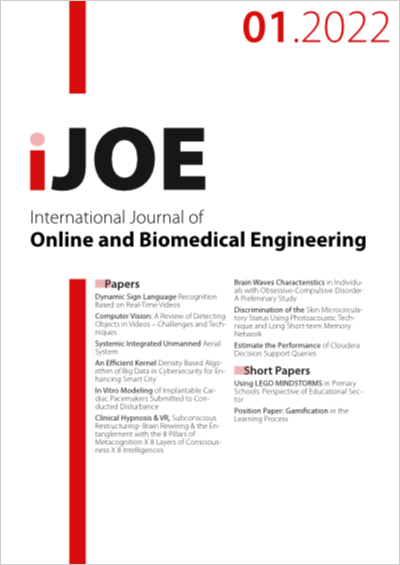Discrimination of the Skin Microcirculatory Status Using Photoacoustic Technique and Long Short-term Memory Network
DOI:
https://doi.org/10.3991/ijoe.v18i01.27415Keywords:
Photoacoustic imaging, microcirculatory changes, temporal features, long short-term memoryAbstract
Measuring oxygen in blood with a standard imaging method is challenging. Most of the conventional imaging systems presented outcomes of microcirculatory change measurement as signals of complex forms. This leads to analytical insufficiency due to the complicated and visually unnoticeable features of the signals. For that reason, there is a great need to explore the use of photoacoustic (PA) method and deep learning technique for the task. This work presents the use of a deep network containing long short-term memory (LSTM) units for temporal features extraction and classification of skin microcirculatory status. The model was trained using a limited number of PA signals. One way ANOVA test was used to evaluate changes in the PA signals collected under different experiment condition. The results showed a strong statistical significance between the means of two groups (ρ < 0.05). The mean ± standard deviation (SD) final validation accuracies of the trained model is given by 95.60 ± 0.47 % with inclusion of augmented data, which showed better performance than the case without the augmentation method. The results of the testing set showed a considerably good classification accuracy, specificity, and sensitivity given by 97.6 %, 100 %, and 83.3%. The future of this work includes improvement of the network architecture to include more convolutional layers for searching patterns in the features extracted.
Downloads
Published
2022-01-26
How to Cite
Chua, H. L., & Huong, A. (2022). Discrimination of the Skin Microcirculatory Status Using Photoacoustic Technique and Long Short-term Memory Network. International Journal of Online and Biomedical Engineering (iJOE), 18(01), pp. 111–126. https://doi.org/10.3991/ijoe.v18i01.27415
Issue
Section
Papers
License
Copyright (c) 2021 Hui Ling Chua, Audrey Huong

This work is licensed under a Creative Commons Attribution 4.0 International License.



